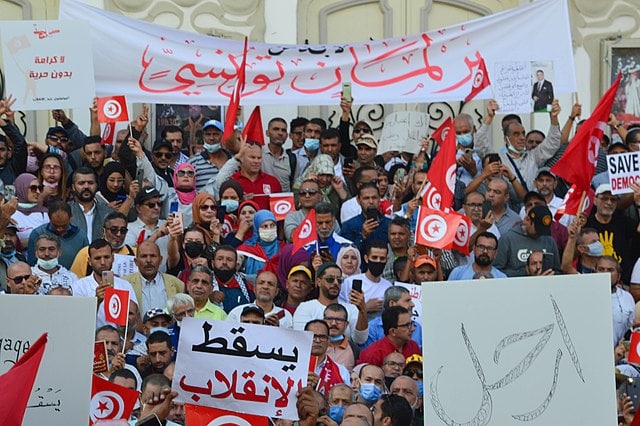Kais Saied, the President of Tunisia, has discharged Prime Minister Kamel Maddouri, in less than 365 days from his appointment. This move comes amidst Tunisia’s struggle with a heightened economic downturn and increasing conflict regarding immigration concerns. Kamel Maddouri’s seat has been filled by Sara Zaafarani, previously Tunisia’s Minister of Equipment and Housing since 2021. Having received her training as an engineer, Zaafarani’s appointment makes her the third individual to hold the Prime Minister position in just under two years, indicating political instability in the country during President Saied’s tenure.
This significant change in Tunisia’s government was announced on a late Thursday and was the culmination of several weeks of strong public reproval from President Saied, specifically targeting numerous ministers. President Saied vocally communicated his criticisms during a National Security Council gathering on Friday, in which he claimed that officials had failed to meet the expectations of the public and called government institutions ‘infiltrated by criminal elements.’
In his robust critique, Saied said these criminal elements have gained roots in many public services and the time for their termination and holding every government officer accountable has arrived. This enforcement of accountability, he noted, applies to all irrespective of their stand in the government or the extent of their negligence or involvement in supporting this infiltrating criminal activity.
Saied’s strong comments emerge in the backdrop of Tunisia’s enduring weak economic performance. The country has simply managed to achieve a GDP growth margin of 1.4% in the past year. The government is also battling to maintain control over ever-increasing public debt and persistent shortages of essential commodities; such as sugar, rice, and coffee.
Further compounding Tunisia’s challenges are the continuing public discontent towards an ongoing decline in public services. Critical sectors including healthcare, transportation, and utilities remain woefully inadequate and beset by issues. In light of this, Saied also dismissed Sihem Boughdiri, the Finance Minister, in February. This move gives an indication of his escalating dissatisfaction with the government’s ineptitude in addressing the economic predicament.
President Saied appealed for an increased interconnected action plan within the government apparatus, actively encouraging the newly anointed Prime Minister to surmount all barriers ‘to meet the expectations of the Tunisian populace.’ And that’s not all; Tunisia is concurrently enduring mounting international criticism over its handling of a escalating migration dilemma.
An increasing number of people stemming from sub-Saharan Africa have landed in Tunisia, intending to use it as a stopover in their quest to cross the Mediterranean Sea, hoping to reach Europe eventually. Presently, a large number are trapped in temporary accommodation camps in southern Tunisian towns like Amra and Jbeniana due to authority-induced blockades.
The frequency of clashes between migrants and the native Tunisian populace has been on an upward trend, thereby amplifying demands for deportations. Concurrently, local human rights organizations have loudly condemned the government’s stance in its rhetoric, accusing officials of racially-charged incitement and blaming migrants for the problems.
Further reigning in on the state of affairs, President Saied, who attained all-encompassing powers in 2021 after he dissolved the elected parliament and assumed rule by decree, reaffirmed his commitment to battling corruption and achieving the ‘liberation’ of Tunisia, during his Friday speech.
He went on to announce that the battle for liberation would persist until justice is accessible to every citizen. ‘We will continue to foil all plots,’ President Saied announced with conviction. Yet, opposition factions and critics view Saied’s consolidation of power as an illegitimate seizure – a coup.
There are widespread concerns that Tunisia’s democratic principles – a country celebrated as the cradle of the Arab Spring, are steadily being eroded under Saied’s stringent rule. Despite the strong allegations, Saied remains steadfast in his actions and resolutions.

